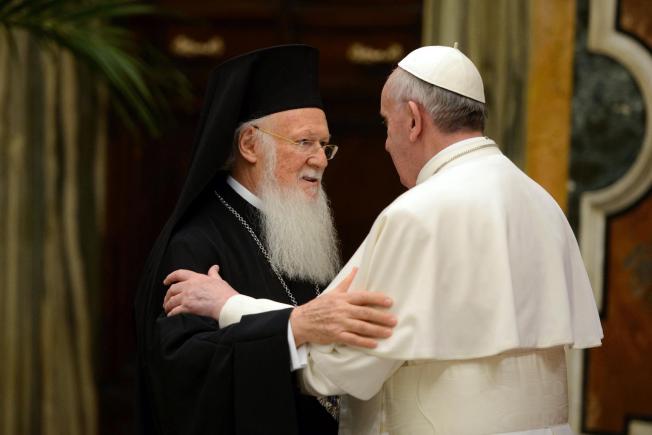Clement Pulaski
Daily Stormer
May 13, 2014

We have thoroughly covered the anti-Christian and anti-traditional statements of Pope Francis. The positions taken by this modernist should sicken any genuine Christian. However, it seems that there are some Christian leaders who are actually embracing Francis, and see in him the hope of greater unity and harmony in the world. Patriarch Bartholomew I of Constantinople, the highest authority in the Orthodox Church, will meet with Francis during the Pope’s groveling, philosemitic tour of the Zionist entity in Palestine. The Patriarch hopes that this meeting will help bring the two churches closer together.
From the AP:
Bartholomew I, spiritual leader of 250 million Orthodox Christians, says a meeting with Pope Francis in Jerusalem this month will help move the two churches closer to ending their nearly 1,000-year divide.
The meetings between the ecumenical patriarch and the leader of the world’s Roman Catholics on May 25-26 will commemorate the historic visit of their predecessors 50 years ago that launched a dialogue aimed at ending the two churches’ schism in 1054.”We shall say through our meeting and our prayer that it is the intention of both of us to work further for Christian unity and reconciliation,” Bartholomew said, sitting at his desk piled high with papers in his Patriarchate office. Around him, golden icons from Byzantium on the walls loomed over standing photos of the patriarch greeting world leaders, including U.S. President Barack Obama and Erdogan.
Although the Orthodox and Catholic churches remain estranged on key issues, including married clergy and the centralized power of the Vatican, there have been moves toward closer understanding, beginning with the 1964 meeting between Pope Paul VI and Ecumenical Patriarch Athenagoras in Jerusalem. It was the first encounter between a pope and Orthodox patriarch in more than 500 years.
Following the meeting, mutual excommunication edicts were dropped, and a Catholic-Orthodox Joint Declaration of 1965 called for greater harmony.
Echoing that declaration, Bartholomew said the road to unity remains long, but that Pope Francis’s acceptance of the invitation to meet in Jerusalem demonstrates that both leaders want to end the divide.
“When it will take place, we don’t know; how it will take place, we don’t know. Only God knows,” he said.
The two leaders will hold a prayer service together at the Church of the Holy Sepulchre, where the faithful believe Jesus was crucified and buried, and issue another declaration. Bartholomew said it had not been finalized.
While we cannot conclude that Bartholomew agrees with everything that Francis is doing, he has not, to our knowledge, shown any strong opposition. Bartholomew attended Francis’ inaugural Mass, the first time that the Patriarch of Constantinople has done so since the great schism between the Latin and Greek churches. If Bartholomew were a true traditionalist, he would condemn Francis’ modernizing tendencies, and openly declare that Francis has moved his church further away from any sort of reconciliation with faithful Christians.
Bartholomew’s willingness to participate in friendly photo-ops with clear enemies of traditional Christianity suggests that the Patriarch’s true allegiance is to the Jewish religion of humanism, not the religion of Christ. The adherents of the religion of humanism dream of a world where all non-“bigoted” people can join together with tolerance and hugs for everyone. The prophets of old did not deal so delicately with those who spoke lies. Men like Francis and Bartholomew maintain the outer trappings of their institutions, while humanism rots their core.
I am certainly not suggesting that all Orthodox Christians or Catholics are complicit in the perfidy of their leaders, and many faithful traditionalists do remain in both churches. Nor will I not comment on the more delicate issue of the validity of church hierarchy and of the sacraments, but I will whole-heartedly declare that the leadership of all of the mainstream churches has been completely corrupted. We cannot depend on these leaders to lend us any support in our struggle against the Jewish New World Order. They have decided to stand with the Enemy.
